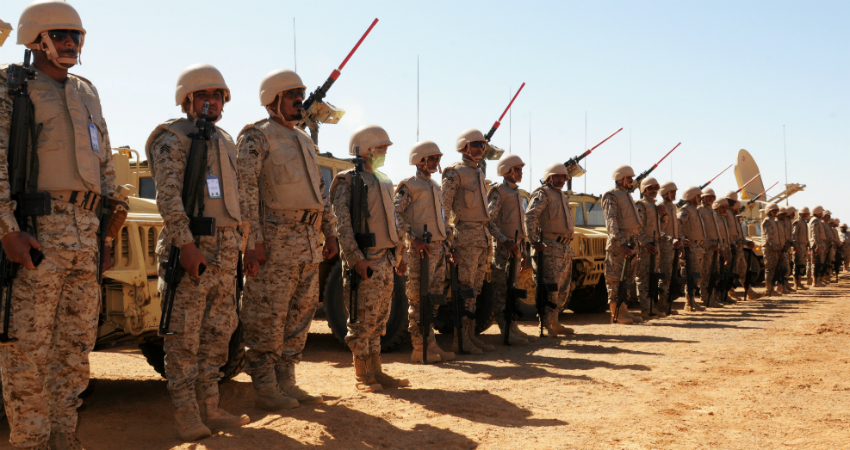Extricating the United States from Yemen: Lessons on the Strategic Perils of Partnered Operations
Editor’s Note: The war in Yemen has gone from bad to worse, and pressure is mounting for the United States to cut its support for Saudi Arabia's failed intervention in the country. But the lessons from this disastrous experience go beyond Yemen. Dafna Rand, the deputy assistant secretary of state for democracy, human rights, and labor under Obama, warns that U.S. Yemen policy must change and that it has lessons for similar efforts when allies wage "limited" wars.

Published by The Lawfare Institute
in Cooperation With

Editor’s Note: The war in Yemen has gone from bad to worse, and pressure is mounting for the United States to cut its support for Saudi Arabia's failed intervention in the country. But the lessons from this disastrous experience go beyond Yemen. Dafna Rand, the deputy assistant secretary of state for democracy, human rights, and labor under Obama, warns that U.S. Yemen policy must change and that it has lessons for similar efforts when allies wage "limited" wars. Far from being an efficient, low-cost use of resources, Rand argues that these wars are not likely to achieve the results Washington wants, yet will implicate the United States in whatever goes wrong.
Daniel Byman
***
The United States has moved closer to ending its calamitous involvement in Yemen’s civil war in recent weeks. While Republicans prevented a vote on legislation that would have formally ended U.S. support for the Saudi-led coalition’s campaign in Yemen, the proposed War Powers resolution is likely to resurface as soon as the Democrats assume power in the House of Representatives in January. Meanwhile, it emerged that the Pentagon would end the most visible, and potentially most controversial, component of U.S. support: mid-air refueling for the coalition’s airplanes. (Formally, the Saudis claimed this decision as their own.) Additionally, Sens. Menendez and Young, with a group of senior bipartisan colleagues, introduced the Saudi Arabia Accountability and Yemen Act of 2018, which, among other significant measures, delineates a road map for America’s exit from the war. A consensus seems to be emerging across the national security ecosystem: U.S. support for this war represents a strategic and moral failure.
The now-obvious perils involved in U.S. support for the coalition offer broader lessons relevant to future partnered operations. What happens when the United States builds and trains partners in the name of a general alliance forged on security guarantees, but then chooses to provide support in a limited fashion when these same forces go to war? Does the United States have recourse when forces built by the United States go rogue, making strategic choices and threat assessments that diverge from their U.S. patrons’?
These are clearly not theoretical questions. They must be seriously considered by all who champion a national security strategy reliant on giving ever more security assistance to partners, independent of those partners’ behavior, professional military conduct, and objectives. The United States can train and build capacity at the tactical and even operational level, but if we cannot influence our partners’ decisions to go to war or to make peace—or even to avoid war crimes—then we have not fully succeeded in building partners’ militaries. Certainly not in a manner that advances U.S. interests, let alone our values.
As long as U.S. strategy remains dependent on building partners’ military capacity around the world, the challenged, and ultimately failed, U.S. involvement in this particular war should give policymakers pause. The experience calls into question whether offering material military support to partners when they go to war can ever be considered a limited operation—especially when these same allies are relying on capabilities derived from decades of U.S. security assistance.
Yemen offers many lessons for U.S.-backed operations.
The first and most important lesson is that it is impossible to turn back the clock. An immense amount of damage has been done over the course of this civil conflict, which has spiraled in new ways and new directions, as every conflict does. The United Nations recently estimated that up to 14 million people (50 percent of Yemen’s population) will face near-famine conditions by the end of 2018. The UN has officially documented 17,000 civilians killed and maimed since the start of the war, though the actual numbers are likely much higher. These rates are increasing—in August 2018 alone, there were 1,000 civilian casualties, including 450 killed over nine days. The casualties are directly linked to coalition airstrikes and to the disregard paid to humanitarian sites by parties to the conflict. Even though the United States offered what it considered limited support to the coalition, the United States will bear the reputational, ethical, and strategic costs of its involvement for years.
The decision to end U.S. refueling will not matter much to the people of Yemen, who still see America’s power and imprimatur behind the coalition offensive. After three years of U.S. support for the coalition, there is no reversing Yemenis’ perception that the United States enabled the devastation of their country, generating the world’s worst humanitarian crisis.
The moral costs to U.S. credibility are matched by the strategic costs. Terrorists based in Yemen, who have attempted to attack the U.S. homeland in the past, will now benefit from a generation of putative recruits aggrieved by U.S. policy in their country. The war created ungoverned spaces where terrorists have once again found safe haven. By generating a new set of radicalizing grievances and creating a physical space for extremists to regroup, this war has decisively set back U.S. counterterrorism efforts.
The second lesson involves the complexity of extricating the United States from partnered operations. On one hand, the limited support provided in March 2015 was tailored and specific: It included mid-air refueling, training, intelligence cooperation, and other operational activities related to the Yemen war specifically. Yet the total sum of U.S. support is far greater than the wartime package offered. The United Arab Emirates and Saudi Arabia have long benefitted from the underlying edifices of the U.S. security partnership—particularly decades of arms sales and training activities.
The longstanding U.S. security assistance partnership with the Gulf states rests on the U.S. foreign military sales program (FMS). Over the past several decades, the State Department has processed billions of dollars in FMS requests for the Saudi military and the UAE and then sent them along for congressional approval. The sum total of these cumulative sales represent the capabilities sustaining the coalition’s current war effort in Yemen. Remarkably, the Menendez/Young bill recognizes this fact. In one of the first legislative acknowledgments of the lock-in effects of previous security-sector assistance, this bill includes a provision that would suspend previously processed sales that are now enabling the Yemen campaign. These senators seem to realize the quandary: Earlier support and training offered by the United States can now be deployed, without oversight, for any purpose, including confronting a threat that does not align with U.S. strategic interests.
Finally, the Yemen experience exposes how offering security assistance in the name of building partner capacity can, paradoxically, erode U.S. influence with partners over time.
The arrangement of limited support for the coalition reached in 2015 was awkward from the beginning. For the first time since the first Gulf War, the United States agreed to support a coalition waging a war in the Middle East, rather than formally joining or leading it. This arrangement meant a priori that the United States would not be driving the big picture decisions. Moreover, U.S. support for the coalition did not earn it enough leverage to sway the coalition’s choice of targets or other operational decisions that would have protected the people of Yemen. Since 2016, the United States has not been able to dissuade its Emirati partners from steadily advancing its troops up the Red Sea coastal region, toward Hodeidah governorate, with significant humanitarian consequences. This past summer and fall, the United Nations and international community warned the UAE and others in the coalition against launching an offensive in Hodeidah in particular, given its population density and the presence of a port through which 70 percent of all humanitarian aid transits into Yemen.
Even as the ethical and reputational costs of every errant coalition airstrike have grown since 2015, the United States has failed to persuade the Saudis to improve their abilities to hit dynamic targets—with high profile, deadly results for the people of Yemen, including attacks on weddings, funerals, and school buses full of children. In 2017, just as the Pentagon began formally investing in tactical training efforts to improve non-dynamic targeting, U.S. strategic leverage seemed to decline, particularly when the Trump administration changed the signaling coming from Washington. What had been the tentative yellow light offered by the Obama administration turned into a green light to the coalition war efforts. By the end of 2017, the United States and United Kingdom could not prevent the Saudis from blockading Yemen’s Red Sea ports, choking off key humanitarian access points and deepening the humanitarian crisis.
In sum, the limited approach chosen by the United States afforded almost no leverage to shape its allies’ doctrine, strategy, or operations. Meanwhile, the Yemen war has exposed that decades of military hardware sales and training clearly left out key principles on how to fight wars, including how to abide by international humanitarian law. For instance, it is regrettable that despite the decades-long project to build the Gulf states’ capacity, the U.S. military’s own hard-won counterinsurgency lessons, learned in Iraq and Afghanistan during this same time period, were never transmitted to these close U.S. allies.
Meanwhile, U.S. support for an ill-fated effort in Yemen has weakened America’s credibility elsewhere in the region, and it undermines the projection of U.S. power worldwide for the U.S. military to have supported a stalemated civil conflict against a small insurgent group. Because of U.S. association with the intervention in Yemen, U.S. diplomats found it more difficult to protest the Russian bombardment of Syrian hospitals and other humanitarian sites in 2015 and 2016. While the current administration may not care, in the future, U.S. policymakers trying to stop what has become an erosion in the norms of warfare worldwide—whether in Syria, Nigeria, or Afghanistan—will find their voices much less credible because of Yemen.

